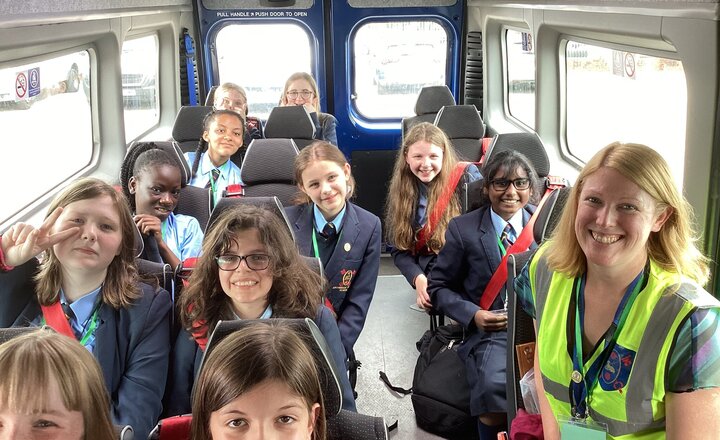Subject: Geography
CURRICULUM INTENT
Students ‘Let their Light Shine’ in Geography through inspiring and well-resourced lessons that excite and engage them to develop their natural curiosity, awe and wonder for the World around them. Our knowledge-rich curriculum promotes Geography as a diverse and dynamic subject that teaches us about the ‘great issues of our age’; a subject that is relevant to our everyday lives and that inspires students to understand their responsibilities as global citizens that demonstrate courageous advocacy, in Christ-like service of others.
Geography plays a key role in enhancing the personal development and spirituality of students in our school. Our students have a love of nature and an appreciation of the intangible - beauty, truth, love, mystery. They respect living things and the environment and look at the world through different ‘lenses’ as they learn to ‘Think like a Geographer’. As students make sense of the world and its people, places and environments, they learn to become decision makers, to look for creative solutions in the face of change, to be critical thinkers who challenge their perspectives on their role in society and the natural environment. Their attitudes and values demonstrate empathy and understanding. We want our students to develop a passion for the subject, such that ‘they may have life, and have it to the full.’ Our high uptake at GCSE and excellent results demonstrates our popularity as a key options group.
IMPLEMENTATION
Our schemes of learning are supportive, challenging and inclusive and our pedagogical practices are current and effective. We interweave the substantive knowledge of place, space, scale, interdependence, sustainability, physical and human processes, environmental impact, cultural awareness and cultural diversity directly with the disciplinary knowledge of map skills, fieldwork, issues evaluation, comparison, research and enquiry, cause and consequence. All pupils study the same curriculum scope and adaptive teaching strategies are employed to maintain high ambitions for all.
We select National Curriculum content judiciously, to develop strong schemata and enable outstanding outcomes for all. Our linear five-year plan is scaffolded from Year 7 to expose students to GCSE and AS material, in an iterative spiralling manner that promotes inter-leaving and retrieval of key concepts. Students see the interconnected nature of the subject as they build knowledge over time and develop metacognitive strategies. Clear connections between components means they are more likely to remember it in the long term. Children read at an age-appropriate level and specific guided reading activities integrate tier 2 and 3 words explicitly. Book reviews demonstrate consistency across the department.
The topics and skill-set required to interpret key concepts and draw conclusions are complex - most progress is made at the end of a topic, as understanding accelerates where pupils develop confidence in their ability to apply key ideas and use their knowledge and metacognitive strategies.

Opportunities for cultural capital and enrichment through trips are catalysts that stimulate further outdoor learning and a thirst for adventure. In Iceland students explore ice caves, lava fields, waterfalls and World class beaches. All GCSE Geographers explore regeneration in Blackpool and coastal management at Cleveleys. KS3 pupils have visited Bowness and also carried out local investigations. Pupils’ procedural knowledge (geographical skills) allows them to gather, analyse, present and interpret spatial information. In doing so, they are adept at identifying patterns and trends. Such fieldwork connects pupils with the complexities of the real world, making it both stimulating and fascinating.
Explicit teaching of British Values promotes fundamental beliefs that underpin what it is to be a citizen in a modern and diverse Great Britain, valuing our community and celebrating diversity of the UK. Key values of democracy, individual liberty, rule of law, respect and tolerance are crucial to the development of well-rounded individuals who demonstrate true awareness and understanding of the society in which we live.
Programmes of Study, Key Stage 3
Year 7: Geo-skills, Exploring the UK, Rivers and Flooding, Exploring the Middle East, Ecosystems, Tropical Rainforests and biodiversity; How is Asia being Transformed?
Year 8: Weather, Climate and Tropical Storms, Population Change, Can the Earth Cope? Glaciation, Tourism in the LDNP.
Year 9: Fieldwork, Restless Earth (Tectonics, Super-volcanoes and Tsunamis), The Development Gap & Migration, Coasts, A Continent of Contrasts: Africa.
Click here to view the Year 9 Options information for Geography.
Programmes of Study, Key Stage 4: AQA GCSE Geography
3 GCSE Papers:
Paper 1 - Physical Geography (90min, 35%: hazards, ecosystems, physical UK – coasts/ rivers)
Paper 2 - Human Geography (90 min, 35%: urban, economic, managing resources)
Paper 3 - Skills (75 min, 30%: issues evaluation, familiar and unfamiliar fieldwork)
Year 10: Paper 2.A) Urban Issues and Challenges, Paper 1.A) The Challenge of Natural Hazards, Paper 1.C) Physical landscapes in the UK (Coasts), Paper 3.A) Human and Physical Fieldwork: Fylde Coast (Cleveleys and Blackpool), Paper 1.B) Living World (Ecosystems and Rainforests)
Year 11: Paper 1.B) Living World (Cold Environments), Paper 2.C) The Challenge of Resource Management, Paper 2.B) The changing economic world, Paper 1.C) Physical landscapes in the UK (Rivers) Paper3.B) Issue Evaluation.
Key Resources
KS3: Hodder Progress in Geography textbook (Gardner); Kerboodle, Firefly, AQA Oxford revision guide
KS4: Oxford GCSE 9-1 Geography textbook (Simon Ross); Kerboodle, Firefly, AQA Oxford revision guide
IMPACT
Quality of Education: we follow school marking, feedback and assessment policies for consistently high outcomes.
Marking, Assessment and Feedback: exercise books are for pupils to take down class notes. Marking is selective and effective - key pieces are identified for assessment, including short retrieval quizzes as mid-topic progress checks. Often these are self/ peer marked or via firefly. General and specific comments are given by the teacher for pupils to note down and make corrections in the form of whole class feedback. Specific areas of success and areas for improvement - key ideas/ theories and misconceptions are highlighted and corrected in this way onto pupil work.
Assessments are carefully designed around the content of the lessons and students are explicitly taught effective exam technique, retrieval strategies, essay writing technique and signs of success. We use a range of ways to assess pupil progress and record marks in planners and SIMS.
Units of Work: Each unit has opportunities for extended writing, guided reading, creative activities, decision making exercises, and scaffolded longer exam questions. Models and clear success criteria are used. Assessment scores or feedback are recorded by teachers to inform progress. All lesson resources are on firefly. The Progress in Geography textbook is used for support.
Unit title pages are glued in student books and present unit aims, subject-specific vocabulary, opportunity for student and parent reflection and guidance on extra reading and learning opportunities. Key terms for each unit are taught explicitly and presented at the start of each unit. Retrieval activities and revision resources are offered for support. End of unit assessments are stored in the back of pupil books.
Home learning: Weekly tasks for KS4 (30-40 min), fortnightly for KS3 (20-30 min). KS4 homework typically includes a 9-mark exam question alongside shorter specific tasks. Homework completion is recorded and students are given guidance on their successes and steps for improvement via specific whole class feedback. Reference to AQA mark schemes is made alongside the use of model answers. Opportunities for green pen TTI (time to improve) reflection and corrections are given as appropriate, such as following a piece of extended writing or an end of unit assessment. KS4 extended writing tasks are marked and recorded by the teacher, typically fortnightly.
Formative assessments are marked by the teacher and scores recorded. Marking highlights inaccuracies in diagrams/graphs as well as quality of written communication including spelling, punctuation and grammar. Pupil voice is used to improve the learning experience via survey and title pages.
Staff Details
Mrs S Thompson – Curriculum Leader of Geography
Mr J Johnson - Teacher of Humanities, Head of Year 10
Mrs R Parkinson – Teacher of Geography, Head of Year 7, AQA examiner.
Careers and Progression
Any career will welcome Geography as a GCSE because it is an enabling, academic and broad subject with a wide skill set (report writing, decision making, data analysis, data presentation, evaluative assessment, team work). Geographers see the big picture and can appreciate different views.
Higher education or further study could include law, environmental management, politics and government, management roles, marine biology, architecture, education, journalism, town planning, environmental science, zoology, engineering, surveying, landscape gardening and many more.
Geography 5 year Curriculum Plan
Click on an image below and scroll through using the arrows.
Take a look at some of the exciting activities and field trips we do in the Geography Department.





















































































.jpg)